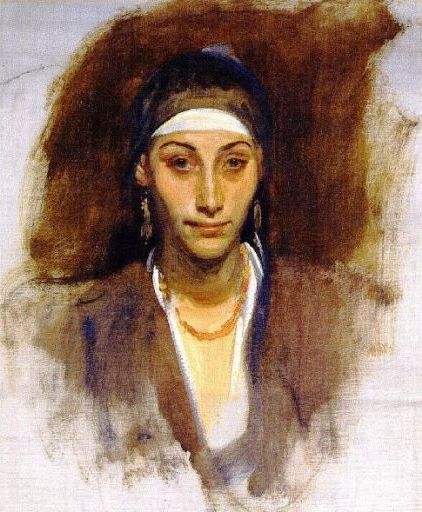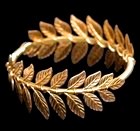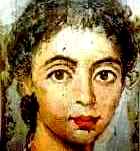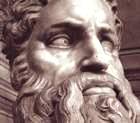 Who was Abigail?
Who was Abigail?
A beautiful, clever young woman who was discontented with her elderly husband Nabel. He was rich but inclined to drink too much – his name means ‘a pouch for holding wine’.
She met David, a handsome, ambitious bandit, and decided she wanted something more than Nabel could give her…
The story explains how David acquired land in Judah, and how his royal harem began.
What is Abigail’s story?
1. David needs food for his men. The landowner Nabal refuses to help him.
2. Nabal’s young wife Abigail betrays her elderly husband, giving food to the handsome young bandit.
3. Nabal dies of rage when he learns about Abigail’s theft. Abigail marries David.
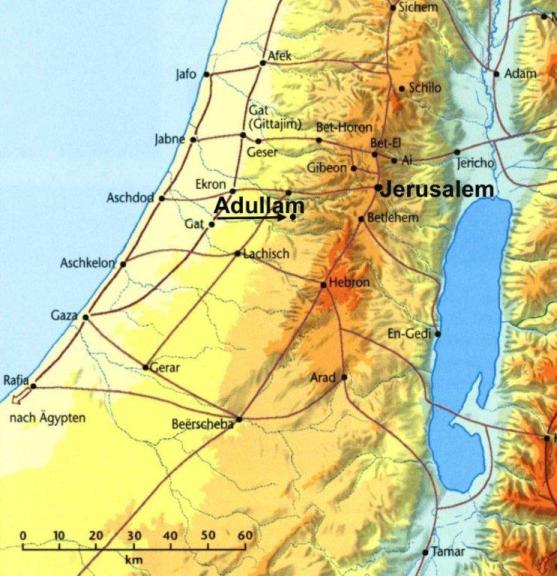
Location of Adullam, where David and his followers lived in a cave
Who were Abigail, Nabal & David?
Abigail’s story begins in about 1060 BC when the great prophet Samuel dies.
Why is this important? Samuel has been David’s main protector and counsellor at the court of King Saul, and without him David is in real danger.
Why is David in danger? Because David is a clever, opportunistic young man, and Saul knows it. Saul has little option but to expel him from the court.
Right from the beginning of this story, the writer is taking sides. He tells us that Samuel is much mourned by thousands of Israelites who trusted him to guide and control Saul.
But we also know that Samuel lost trust in Saul and favoured the young David instead. Thus as far as the writer is concerned,
- Saul = bad, David = good.
There are two other characters who appear at this point:
- Nabal (bad and rich) and his young wife Abigail (beautiful and clever).
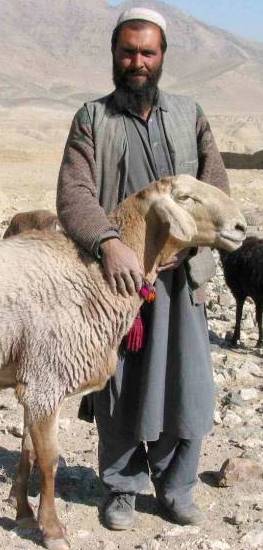 David’s demand/request
David’s demand/request
The story begins at shearing time, and the mood is similar to a harvest festival: boisterous, unruly, lots of food and wine.
David, expelled from King Saul’s court, is now living rough in the hills above the pasture land on the plains.
He has became a magnet for every malcontent in the area – there are about six hundred of them altogether, a sizeable force of men.
Knowing that the shearing festival promotes a certain largesse among owners of sheep and cattle, David sends some of his followers to one of the richest men in the area (Nabel) with a request for some payment for his services.
David does not shrink from extorting money from his own countrymen, or from raiding neighbouring Philistine villages where he slaughters all the men, women and children and loots their village.
David’s world lends itself to violence.
What has David done to deserve payment?
He and his men have refrained from attacking Nabal’s shepherds and flocks.
In other words, it is a protection racket, and Nabal is required to pay protection money. According to the Bible text the request is politely worded, but it is a threat nevertheless. Nabal refuses, pointing out that he has no obligation to feed bandits.
At this point David must stand his ground or lose face with his followers.
He orders four hundred of his men to gather up their arms and follow him down from the hills to attack Nabal’s house.
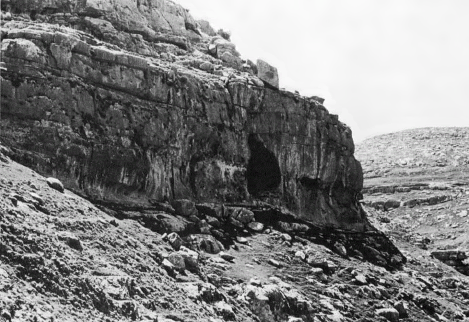
Cave in the Judean hills near Adullam, the area where David took refuge
Abigail betrays Nabal
Meanwhile, a young man in Nabal’s household goes privately to Nabal’s wife Abigail and tells her what is going on.
- He says that since David’s followers have refrained from attacking the shepherds or stealing their flocks, Nabal ought to pay for the favour.
- He explains that he would go to Nabal himself, if only her husband were not likely to get angry at this suggestion.
Can she, Abigail, help?
Abigail is not only beautiful: she is quick-witted and shrewd. She knows her husband will refuse David’s demand, so without letting her husband know what she is doing, she gathers up several donkey-loads of food – wine, bread, dried fruit and grain.
Since David’s band numbers at least four hundred, the food is merely a gesture to show whose side she is on. She is trying to prevent a confrontation that would be disasterous for both David and Nabal.
David is on his way to Nabal’s house when he meets Abigail with her laden asses. He is still full of bluster and threats, but she is charming – apparently docile, a beautiful woman begging for forgiveness for her husband’s ‘blunder’.
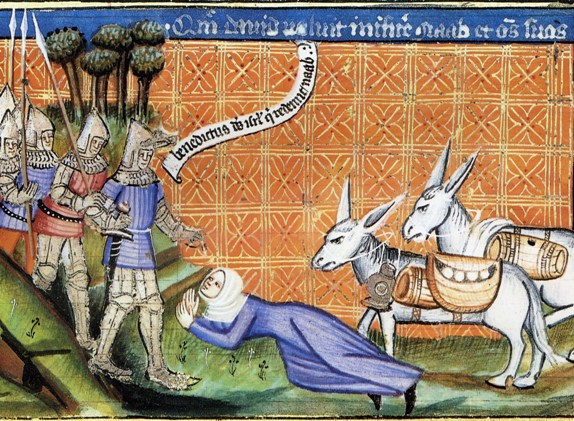
Abigail, with some rather cross-looking asses, meets David: medieval manuscript
She falls to the ground, bowing low, begging forgiveness for a husband she describes as a dolt.
Her beauty and her flattery – and the sight of the food – win David over. In a lordly speech
- he forgives Nabal for objecting to extortion, and
- forgives her as well for being married to a man who has refused to submit to his demands.
It is a telling speech. We see a glimmer of the way David was so often able to charm his way out of awkward situations.
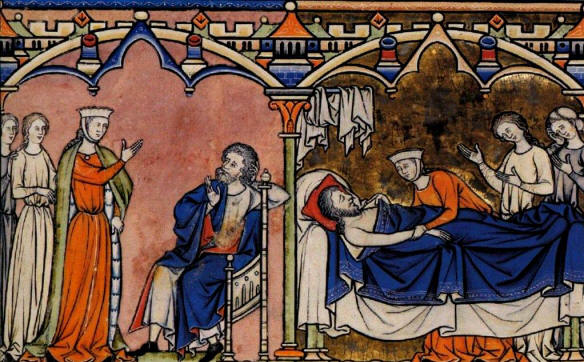
Nabal dies, Abigail marries David
Abigail leaves David and goes to her husband Nabal – to tell him what she has done? The text is not clear.
The riotious harvest festival is going on. Nabal, along with everyone else except Abigail, is drunk. She is stone cold sober. Seeing that she will get no sense out of her husband, Abigail retreats to her quarters and waits for her husband to sleep it off.
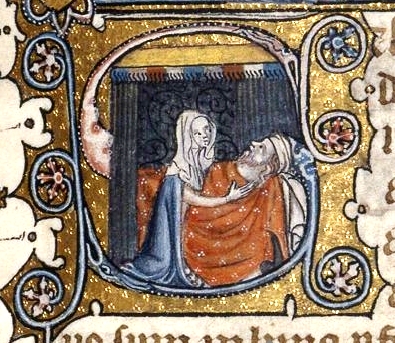 In the morning she goes to him and tells him what she has done: taken authority into her own hands in direct defiance of his wishes, and given food supplies to the bandit David.
In the morning she goes to him and tells him what she has done: taken authority into her own hands in direct defiance of his wishes, and given food supplies to the bandit David.
When he hears about his young wife’s treachery, Nabal suffers a stroke: ‘his heart died within him and he became as a stone.’ About ten days later he dies.
On hearing of Nabal’s death, David immediately makes an astutue statement that absolves him of all blame. The gist of it is that it was Nabal’s fault anyway. He brought it on himself.
Abigail is now a rich widow, and David loses no time in turning the situation to his advantage.
He sends his servants (he does not go himself since he would almost certainly have been killed by Nabal’s clansmen) to ask Abigail to marry him.
He already has a wife, King Saul’s daughter Michel, but he has abandoned her when her usefulness came to an end.
Abigail, now most unwelcome in her own home, accepts his offer gracefully.
She leaves her home accompanied by her five maids, travels to David, and becomes his wife.
This might seem like a happy ending for Abigail, but at about the same time, David marries another woman, Ahinoam of Jezreel; she later gives David his eldest son, and Abigail later gives him his second son.
We hear no more of Abigail after this. She seems to have been relegated to a secondary political status in David’s court.
It is hard to like anyone in this story. All of them, including David, behave badly: a reminder that the Jewish Scriptures often describe people as they are, not as they should be.
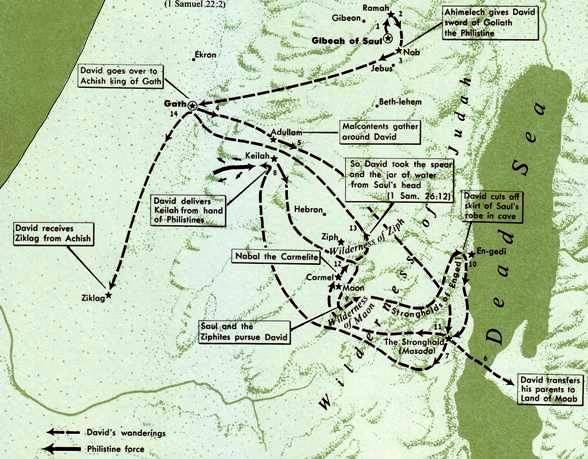
Map showing location of events in David’s life
What can we learn from Abigail’s story?
Be careful when you make life choices.
A Bible woman was married at a very young age to a husband chosen by her family. In Abigail’s case they chose Nabal, and she cannot be blamed for their choice.
But modern women usually choose their own husband. They should try to be wise in their choice.
The Bible text – 1 Samuel 25
1 Now Samuel died; and all Israel assembled and mourned for him, and they buried him in his house at Ramah. Then David rose and went down to the wilderness of Paran.
2 And there was a man in Ma’on, whose business was in Carmel. The man was very rich; he had three thousand sheep and a thousand goats. He was shearing his sheep in Carmel. 3 Now the name of the man was Nabal, and the name of his wife Ab’igail. The woman was of good understanding and beautiful, but the man was churlish and ill-behaved; he was a Calebite.
4 David heard in the wilderness that Nabal was shearing his sheep. 5 So David sent ten young men; and David said to the young men, “Go up to Carmel, and go to Nabal, and greet him in my name. 6 And thus you shall salute him: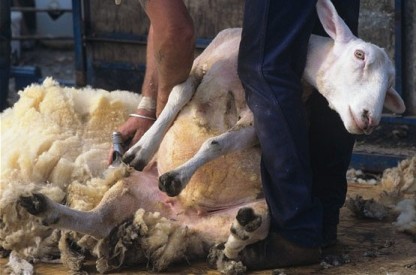 ‘Peace be to you, and peace be to your house,Man shearing a sheep and peace be to all that you have. 7 I hear that you have shearers; now your shepherds have been with us, and we did them no harm, and they missed nothing, all the time they were in Carmel. 8 Ask your young men, and they will tell you.
‘Peace be to you, and peace be to your house,Man shearing a sheep and peace be to all that you have. 7 I hear that you have shearers; now your shepherds have been with us, and we did them no harm, and they missed nothing, all the time they were in Carmel. 8 Ask your young men, and they will tell you.
Therefore let my young men find favor in your eyes; for we come on a feast day. Pray, give whatever you have at hand to your servants and to your son David.‘”
9 When David’s young men came, they said all this to Nabal in the name of David; and then they waited. 10 And Nabal answered David’s servants, “Who is David? Who is the son of Jesse? There are many servants nowadays who are breaking away from their masters. 11 Shall I take my bread and my water and my meat that I have killed for my shearers, and give it to men who come from I do not know where?”
12 So David’s young men turned away, and came back and told him all this.
13 And David said to his men, “Every man gird on his sword!” And every man of them girded on his sword; David also girded on his sword; and about four hundred men went up after David, while two hundred remained with the baggage.
14 But one of the young men told Ab’igail, Nabal’s wife, “Behold, David sent messengers out of the wilderness to salute our master; and he railed at them. 15 Yet the men were very good to us, and we suffered no harm, and we did not miss anything when we were in the fields, as long as we went with them; 16 they were a wall to us both by night and by day, all the while we were with them keeping the sheep.
17 Now therefore know this and consider what you should do; for evil is determined against our master and against all his house, and he is so ill-natured that one cannot speak to him.”
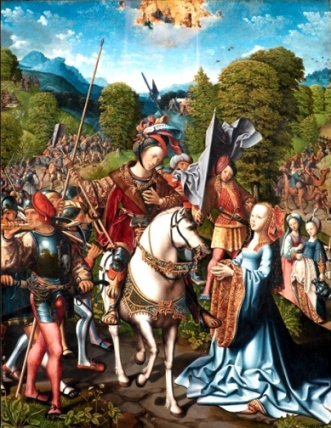 18 Then Ab’igail made haste, and took two hundred loaves, and two skins of wine, and five sheep ready dressed, and five measures of parched grain, and a hundred clusters of raisins, and two hundred cakes of figs, and laid them on asses. 19 And she said to her young men, “Go on before me; behold, I come after you.” But she did not tell her husband Nabal.
18 Then Ab’igail made haste, and took two hundred loaves, and two skins of wine, and five sheep ready dressed, and five measures of parched grain, and a hundred clusters of raisins, and two hundred cakes of figs, and laid them on asses. 19 And she said to her young men, “Go on before me; behold, I come after you.” But she did not tell her husband Nabal.
20 And as she rode on the ass, and came down under cover of the mountain, behold, David and his men came down toward her; and she met them. 21 Now David had said, “Surely in vain have I guarded all that this fellow has in the wilderness, so that nothing was missed of all that belonged to him; and he has returned me evil for good. 22 God do so to David and more also, if by morning I leave so much as one male of all who belong to him.”
(The King James version of the Bible translates this verse as ‘So and more also do God unto the enemies of David, if I leave of all that pertain to him by the morning light any that pisseth against the wall’, that is, any man!)
23 When Ab’igail saw David, she made haste, and alighted from the ass, and fell before David on her face, and bowed to the ground. 24 She fell at his feet and said, “Upon me alone, my lord, be the guilt; pray let your handmaid speak in your ears, and hear the words of your handmaid. 25 Let not my lord regard this ill-natured fellow, Nabal; for as his name is, so is he; Nabal is his name, and folly is with him; but I your handmaid did not see the young men of my lord, whom you sent.
26 Now then, my lord, as the LORD lives, and as your soul lives, seeing the LORD has restrained you from bloodguilt, and from taking vengeance with your own hand, now then let your enemies and those who seek to do evil to my lord be as Nabal. 27 And now let this present which your servant has brought to my lord be given to the young men who follow my lord. 28 Pray forgive the trespass of your handmaid; for the LORD will certainly make my lord a sure house, because my lord is fighting the battles of the LORD; and evil shall not be found in you so long as you live. 29 If men rise up to pursue you and to seek your life, the life of my lord shall be bound in the bundle of the living in the care of the LORD your God; and the lives of your enemies he shall sling out as from the hollow of a sling.
30 And when the LORD has done to my lord according to all the good that he has spoken concerning you, and has appointed you prince over Israel, 31 my lord shall have no cause of grief, or pangs of conscience, for having shed blood without cause or for my lord taking vengeance himself. And when the LORD has dealt well with my lord, then remember your handmaid.”
32 And David said to Ab’igail, “Blessed be the LORD, the God of Israel, who sent you this day to meet me! 33 Blessed be your discretion, and blessed be you, who have kept me this day from bloodguilt and from avenging myself with my own hand! 34 For as surely as the LORD the God of Israel lives, who has restrained me from hurting you, unless you had made haste and come to meet me, truly by morning there had not been left to Nabal so much as one male.”
35 Then David received from her hand what she had brought him; and he said to her, “Go up in peace to your house; see, I have hearkened to your voice, and I have granted your petition.”

The sort of hill-cave in which David and his bandits hid
36 And Ab’igail came to Nabal; and, lo, he was holding a feast in his house, like the feast of a king. And Nabal’s heart was merry within him, for he was very drunk; so she told him nothing at all until the morning light.
37 And in the morning, when the wine had gone out of Nabal, his wife told him these things, and his heart died within him, and he became as a stone. 38 And about ten days later the LORD smote Nabal; and he died.
39 When David heard that Nabal was dead, he said, “Blessed be the LORD who has avenged the insult I received at the hand of Nabal, and has kept back his servant from evil; the LORD has returned the evil-doing of Nabal upon his own head.”
Then David sent and wooed Ab’igail, to make her his wife. 40 And when the servants of David came to Ab’igail at Carmel, they said to her, “David has sent us to you to take you to him as his wife.” 41 And she rose and bowed with her face to the ground, and said, “Behold, your handmaid is a servant to wash the feet of the servants of my lord.”
42 And Ab’igail made haste and rose and mounted on an ass, and her five maidens attended her; she went after the messengers of David, and became his wife. 43 David also took Ahin’o-am of Jezreel; and both of them became his wives. 44 Saul had given Michal his daughter, David’s wife, to Palti the son of La’ish, who was of Gallim.
© Copyright 2006
Elizabeth Fletcher

